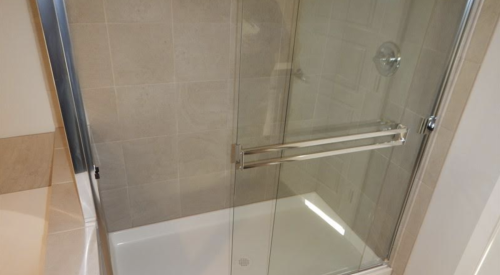USG Corp. announced last month that it will cease the manufacture and sales of all exterior finish products used in DEFS (Direct Applied Exterior Finish Systems) and EIFS (Exterior Insulation and Finish System), both water managed or drainable systems, on April 1, 2001.
According to a release from USG, the company has, for the past four years, "strongly promoted the value of water managed DEFS and EIFS," but has decided to exit the exterior finish products business having found that "water managed systems have not been widely embraced as the industry standard."
The company quit making the barrier-type EIFS product in 1995. Barrier systems, which consist of several components including insulation board that is attached to the substrate with an adhesive, a fiberglass mesh imbedded in a base coat and a decorative finish coat, is banned in many areas of the country including North Carolina and Georgia. Consumer complaints and suits contend that moisture trapped behind the multi-part cladding system cause significant water damage because the system provides no means for water to escape. Cases of water infiltration in this type of system are well-documented, according to NAHB Research Center Director Tom Kenney, who says water frequently enters around windows, doors and architectural detailing, and can take months to finally evaporate.
Drainable systems, which are still manufactured by several companies including Sto, Dryvit and Senergy, were created in response to problems associated with non-drainable EIFS. This type of system includes a mechanism in which water infiltrating the exterior skin is halted at the building paper and directed down and out of the wall by means of flashing and weep details.
John Mandel, a spokesman for USG, contends that despite USG's move over six years ago to drainable EIFS products, the company has always been a small player in the industry. He says that the products had not been as widely accepted as the company had hoped, and therefore USG decided that to focus on growing that sector of their business would be very difficult and not worthwhile. When asked, Mandel responded that controversy regarding the product did not influence the company's decision, and that USG was not hit by the lawsuits some manufacturers have been plagued with.
The company says it will continue to meet demand for all of its exterior finish products until April 1 and then sell off its remaining inventory. USG Corporation will continue to manufacture and market its line of exterior substrate panels, sold under the names DUROCK, FIBEROCK and SHEETROCK, and it will continue to honor the warranties for all products sold.
Does USG's drop-out mark a trend in the much-beleaguered world of EIFS? Perhaps only time will tell, but industry leaders don't think so. Bill Kasik vice president of sales, marketing and technical services of Senergy, the second largest manufacturer of EIFS in the country, says the USG's decision is not so surprising. He says that USG, although highly respected in the EIFS industry and the building industry in general, has merely chosen to focus on its core business. He sees a case of capacity dwarfing demand, and predicts that consolidation rather than drop-outs will be a trend for the EIFS industry, as companies hone in on their most profitable aspects in the increasingly tight economy.









